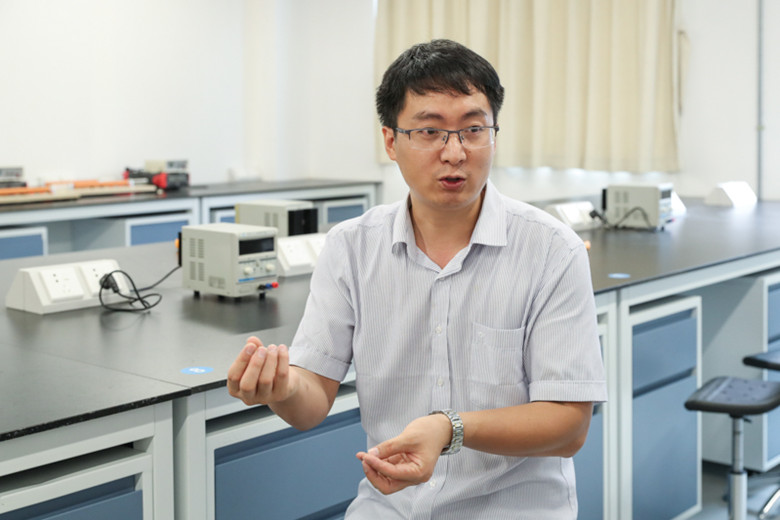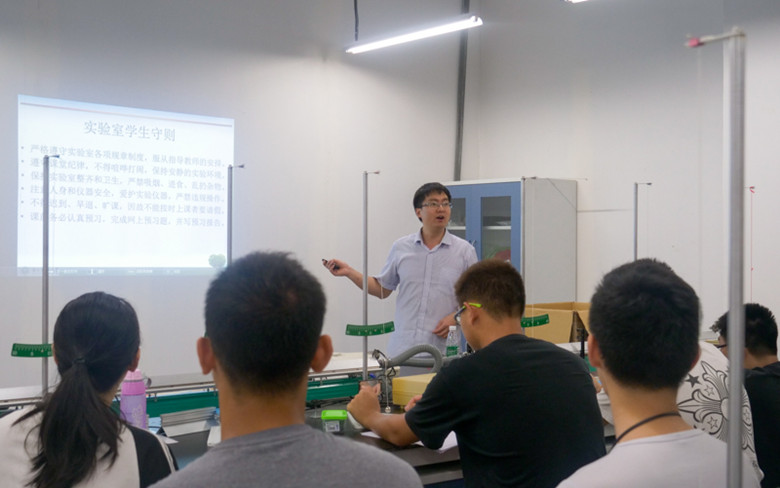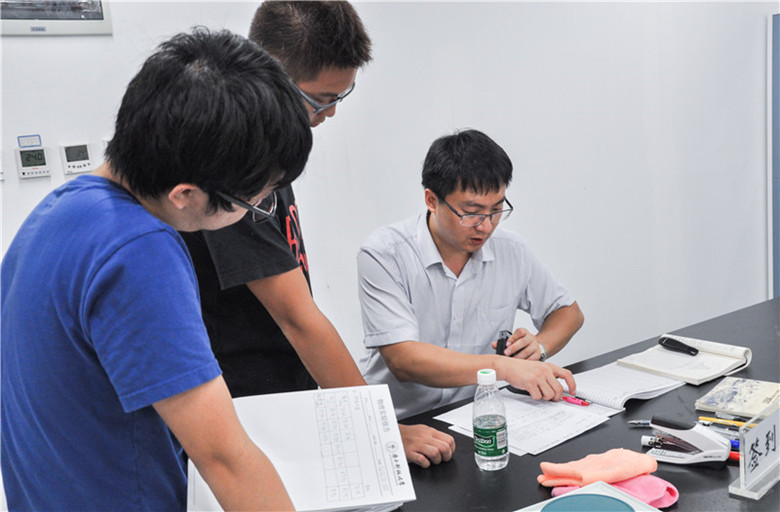Researchers make breakthrough in magnetic geometry-induced quantum geometry and nonlinear transport
2025-06-06SUSTech hosts IOP Forum with President of Institute of Physics Sir Keith Burnett
2025-03-26Researchers discover unusual thermal conductivity in high-symmetry single crystals
2025-03-26New efficient method detects quantum temporal correlations
2025-03-26Researchers explore unconventional magnons predicted by spin space groups
2025-03-25Conversation with Wang Cailin is easy with his infectious, funny and straightforward personality. Interviewing him is like interviewing an old friend you have known for a long time.
Wang Cailin is a Ph.D. in condensed matter physics from the University of Science and Technology of China. He is currently a physics experiment teaching engineer at Southern University of Science and Technology. He won the "Outstanding Teaching Staff Award" at the 2018 SUSTech Teacher's Day Awards ceremony, where he said that this honor is a recognition of his teaching and research work.
In his teaching work, Wang Cailin is serious and responsible and often studies innovative teaching methods. In 2016, he won the first experimental course group prize in the first young teachers teaching competition at SUSTech. In the student training, he educates the students to have proper scientific methods, and his easy and humorous teaching method is loved by all.

To keep the knowledge and action go hand in hand
At around 9:00 in the morning, Wang Cailin came to Lychee Hills(campus) to organize experimental equipment to prepare for the day's curriculum. Dr. Wang’s classroom atmosphere is relaxed and active. He explains the physics knowledge to the students in a simple way. The students also like to listen and feel free to discuss.
When starting class, Wang Cailin will give the students some time to discuss the pre-study content, before moving onto the explanation of physics knowledge. Through mutual communication and systematic combing, the problems encountered by the students in the process of previewing the materials will be solved.
SUSTech focuses on cultivating students' hands-on ability, and they can enter the lab in their freshman year. In Wang Cailin's physics class, students spend most of their time doing experiments. Wang Cailin shuttled among the students, patiently answering questions and correcting their mistakes. Wang Cailin repeatedly emphasized the importance of “practice” for scientific study.
"Physics is not difficult." Wang Cailin explained. He believes that the reason why people feel physics is difficult is that the knowledge in books is two-dimensional, and students need to use knowledge in two-dimensional description to construct 3D reality, so it is not easy. If theoretical knowledge can imitate real life, which is presented in a 3D manner, it will feel very clear and straightforward. On the other hand, the existing learning model of “practicing after learning theory first” or “learning theory after experimenting first” cannot deepen students' understanding of knowledge points to the greatest extent. He believes that the best way should be to “learning theory before doing an experiment and then learning theory” or the model of "learning the theory and then doing the experiment first."
Wang Cailin also stressed that learning more theoretical knowledge is not as impressive as creating an experiment by himself. Just like a person looking at a map many times, it is better to be impressed by going to the scene. It is the same reason. In addition, the various knowledge points of physics knowledge are not divided. If you can recognize the connection between them and establish your own knowledge structure, learning physics will come naturally with less theoretical knowledge.
Wang Cailin also shared some of his innovations and reflections on teaching in recent years. He pointed out that Comenius's "Great Didactic" mentioned that most people could master 80% of the content through visual and auditory learning, but combined with other senses, such as taste and touch, people will be able to absorb more knowledge. How can we promote the “visualization” of learning materials? This is also the direction that Wang Cailin has been working hard.
“We have been thinking about how we can make our teaching materials more realistic and let our students deepen their understanding of science in their daily study and life. We will also do some virtual simulation of learning materials, but there will still be a certain gap from reality."
On the road of teaching, Wang Cailin has been seriously polishing his teaching methods, constantly introducing new ideas, and enjoying it.

Knowing ourselves and knowing each other
In addition to teaching work, Wang Cailin often leads students to participate in various physics competitions at home and abroad. His students have achieved good results in all competitions. Wang Cailin said that the most important thing to guide students to participate in the competition is to "know your own strengths and know what to do." It is not enough to have the knowledge and strength, but you must know enough about your opponents, competition system and judges to stand out from the competition.
The most impressive game for Wang Cailin was that he led two teams to participate in the 15th Guangdong University Student Physics Experiment Design Competition. The team responsible for the “airbag experiment in liquid” won the first prize while Wang’s team, who were responsible for “designing a device to realize water-drip discharge,” won the second prize. After the results of the competition, the five big boys who won the second prize shed tears. They thought that the team had made great efforts and had unique insights into the data analysis process. In the course of the defense, they had answered every question in English. The podium places felt predetermined, but the reality left them with huge gaps in their hearts. Wang Cailin analyzed the process of the experiment with them, the judging process of the judges, and the process of communicating with others. As a result, the group was able to join him in analyzing the places they did not do well. In the end, they objectively recognized their own shortcomings.
"Participating in the competition is not just about showing your experimental results. It also includes communication between people. It is important for the judges to understand and appreciate your thoughts. It is not only scientific research but also communication. It is very important to participate in the competition. In fact, it is the comprehensive ability of students." Wang Cailin said.
“Participating in physics competitions can also train students' hands-on ability. In school, students usually use off-the-shelf equipment for experiments. This competition is different, as it is necessary to make experimental equipment from scratch. This requires students to go online and go to the mall. Buying materials and organizing them is the process that tests students' abilities."
Wang Cailin believes that participating in the competition is also a kind of social education. In the field of talented people, competing with players from well-known colleges and universities across the country is a process of mutual learning and growth. This can broaden the students’ horizons and help them recognize their own strengths and weaknesses.
"Young people can't be afraid of failure," Wang Cailin said. "It doesn't matter if you hit the wall. It will be of great benefit to the future development of the students. Don't be proud of success and continue to move forward steadily."

Education is to help students to develop their way of thinking
In the eyes of the students, Wang Cailin is a good teacher. He always infects everyone with humorous words and positive and optimistic attitudes. He often speaks of "cold humor" that uses scientific knowledge. At the same time of achieving educational goals, it is also easier for students to accept. After the teacher's guidance in class, some students still do not understand. Wang Cailin will let the two students discuss for a while. He jokingly said: "Students communicate with each other better. They have similar energies so its easier to produce academic resonance."
If there are students late in class, Dr. Wang will guide them in a relaxed and humorous way: "We often say in physics that the principle of the lowest energy is universal, just as the arrangement of electrons outside the nucleus of an atom always fills the lower energy layer first, so your laziness is basically in line with the principle of 'lowest energy.' But each of us has the internal driving force and external driving force. As the internal driving force of students, we demand knowledge to drive us forward. The external driving force is mainly the test and the score. The students that arrive late need to strengthen their internal driving force. Of course, we can also help them strengthen the external driving force. The internal and external driving forces can match better to make their own luminous fever in each student."
In addition to teaching, Wang Cailin also often receives emails from students about learning, life, and even emotional issues. In this regard, Wang Cailin always gives patient answers one by one. If students have some problems with the learning method, Wang Cailin will also recommend his easy-to-use app. At SUSTech, many teachers are like this, and the relationship with students is very close.

Tao Xingzhi, a famous Chinese educator, once said: "A good education is not about inculcating knowledge, but about giving the key to the development of cultural treasures to students." In Wang Cailin's mind, the significance of education is not only the preaching, teaching, and puzzle solving. More importantly, it is about training the students in a positive way of thinking. If you can cultivate students' logical and dialectical thinking, teach them how to broaden their thinking and improve their cognitive ability, then the students will find great benefits in their future study and lives.
The purpose of education is not only to impart knowledge to students but also to cultivate people with morality and affection. “This requires teachers to have a high moral standard and a sense of responsibility,” said Wang Cailin. “It is also necessary for students to establish certain moral standards. They need to know where the moral bottom line of society is and what the bottom line cannot be exceeded.”
It is this kind of flexible educational method that has enabled Wang Cailin to train a group of outstanding students, such as the 2018 outstanding graduate Jiang Haoyue. In the future, he will continue to work hard at SUSTech and know how to apply his knowledge to the work and keep moving forward.
Text: Tong Xiaojin
Translated and Adapted: Chris Edwards
Proofread: Xia Yingying
Photo: Zhang Xiaoyan